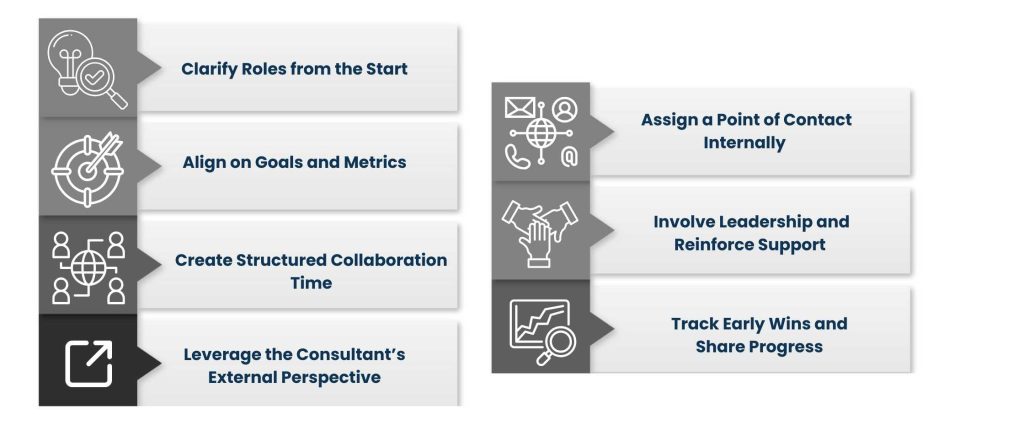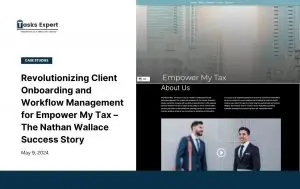Introduction
You hired a Business Development Consultant. Smart move. Whether you’re looking to grow into new markets, better the quality of your leads, or refresh your approach to outreach, an outside perspective can open up new possibilities. However, integration is not automatic if you already have a sales team in place.
The challenge isn’t simply about hiring the right consultant — it’s about making sure they plug in without tripping over feet, disrupting workflow, or duplicating efforts. Done right, it makes your sales team sharper, more strategic, and, yes, more focused. Done badly, you end up with awkwardness, confusion, and underutilized potential.
First, let’s examine why this alignment is particularly crucial for business development.
Why Business Development Consultants Should Align with the Sales Team
Hiring a Business Development Consultant can be a smart, powerful decision for any organization looking to expand, but without alignment with your sales team, progress slows down. Consultants may have fresh, out-of-the-box ideas and strategic thinking that you don’t, but your sales team has the frontline experience and understanding of the customer. When those two forces join up, you get killer things. When they exist in different directions, it leads to friction, duplication, and confusion.
Here’s why you can’t afford to be misaligned between your business development consulting partner and your internal sales team:
1. Strategy Is Only Effective When It's Grounded in Reality

Consultants often start with big-picture strategies: new market opportunities, improved lead generation channels, or a revamped sales process. But unless those ideas are built on real-world customer insights and internal sales workflows, they won’t stick.
Your sales team knows what objections customers bring up. They know which tactics have worked (or failed) in the past. Aligning with them ensures the consultant’s strategy isn’t theoretical—it’s practical, testable, and tuned to your customers and business model.
2. Sales Reps Are More Likely to Execute What They Help Shape

No one likes having a new process dropped on their desk with no input. If your sales reps feel like an outsider is telling them how to do their job, they’ll resist, consciously or not. But if they’re involved in refining the strategy, they’ll take ownership of it.
Business development consultants who engage with the sales team early build trust and credibility. The result? Higher adoption of new processes, tools, and outreach methods, because the reps feel heard, not overridden.
Also Read: Virtual Assistant Services in Strassen
3. Messaging and Positioning Must Be Consistent

One of the biggest gaps between business development and sales comes down to messaging. If your consultant develops a new pitch or sequence, and your sales reps are pitching old scripts/outdated personas, you’re not on the same page, and you have mixed messaging out there in the market.
Alignment makes sure the language used in top-of-funnel campaigns reflects what occurs in real-life sales conversations. Such consistency further cements your brand and instills trust in your leads, making it far simpler to move them down the funnel.
4. It Prevents Repetition and Wasted Effort

Without alignment, you risk duplication. Your sales team might be building their outreach campaigns while your consultant is developing a similar system in parallel. Or worse, both parties may chase the same accounts using different tactics.
When everyone is on the same page, you streamline efforts, reduce confusion, and use time and resources more efficiently. Clear roles and shared tools go a long way here.
5. It Strengthens the Consultant's Impact

Ultimately, business development consultants are judged by the results they help generate—new revenue, stronger pipelines, faster closes. And those results live within the sales team.
By aligning closely with sales, consultants don’t just hand over ideas, they become part of the engine driving growth. That kind of integration not only benefits the business, but it also makes the engagement more successful and sustainable for everyone involved.
How to make the integration work

1. Clarify Roles from the Start
Before you introduce your consultant to the team, clarify why they’re being brought in and what they’re here to do. Are they helping you break into a new vertical? Fixing a broken pipeline? Creating systems your sales team can scale?
Communicate their role clearly, not as someone replacing or evaluating the sales team, but as a strategic partner brought in to enhance what’s already working and help fix what’s not. Explain how their skills complement the team’s efforts, maybe they bring market insights, process design expertise, or connections the team can leverage. When everyone knows where the consultant fits in and what success looks like, it reduces resistance and sets the tone for collaboration. It also avoids miscommunication later on when roles and responsibilities start to overlap in the day-to-day work.
2. Align on Goals and Metrics
Business Development Consultants work best when they’re aligned with your internal success metrics. Set joint goals: improving lead quality, shortening the sales cycle, boosting win rates, or exploring new customer segments.
Give the consultant and your sales manager visibility into these metrics. Regularly review progress together to keep everyone moving toward the same outcome, not working in different directions.
Be specific about which numbers matter most, like qualified leads per month, conversion rates, or pipeline value. Clear, shared KPIs keep discussions focused and make it easier to identify what’s working and what needs adjusting. When everyone’s aiming for the same results, collaboration feels purposeful, and accountability becomes shared.
3. Create Structured Collaboration Time
Don’t just hope that collaboration will “happen.” Set up weekly syncs or working sessions between the consultant and key team members. These can be used for strategy development, reviewing outreach templates, qualifying leads, or analyzing sales funnel performance.
This ensures your consultant isn’t just giving advice; they’re actively learning from and guiding the team in real time. When meetings are structured and regular, they create a rhythm where success can build. Reps start seeing the consultant not just as a strategist, but as a resource they can lean on for feedback and clarity. It also gives consultants the chance to hear real objections, see deal friction points, and adjust strategies on the fly. Over time, these touchpoints lead to smoother integration and faster progress.
4. Leverage the Consultant’s External Perspective
Your consultant brings outside experience from other industries, companies, and client types. That’s gold, especially when your internal team may be too close to the product or stuck in “how we’ve always done it” mode.
Encourage your sales team to ask questions, challenge assumptions, and explore new ideas during joint meetings. The fresh perspective is one of the main benefits of business development consulting; use it fully.
Consultants often spot gaps that internal teams overlook, whether it’s a broken follow-up process or missed messaging opportunities. They can introduce best practices from other high-performing teams and help your reps test new techniques without major disruption. Instead of treating the consultant’s ideas as “outsider advice,” treat them as a chance to stretch your thinking and evolve faster.
5. Assign a Point of Contact Internally
To prevent messages from falling through the cracks, designate someone on your team to be the primary contact for the consultant. This helps keep requests, updates, and feedback contained and helps both parties keep the relationship smooth.
It also helps the consultant get buy-in more quickly and ensures that they have someone who can help them navigate internal culture, systems, and workflows. Without a single point of contact, the consultant could spend time searching for answers or duplicating work in progress. A point person can help to quickly contextualize, raise obstacles, and escalate when appropriate. It’s also a sign to your team that collaboration is deliberate, not a side project, and that a structure is in place to support it. This tiny bit can speed everything up and make things less confusing.
6. Involve Leadership and Reinforce Support
If you take the consultant seriously, so will your team. Leadership needs to introduce the consultant, explain the benefit of their being there, and then make sure they have the backing of the business while they are in the role.
When Leaders participate in check-ins, progress reviews, or strategy sessions, it creates alignment, urgency, and credibility. And it’s also a visual message that says, this program is important, and the decision maker has got my back. Such backing not only grants the consultant authority but also encourages the sales team to get involved proactively. Continual emphasis from executives ensures the advisor is not sequestered off or treated as “just another vendor.” Instead, they’re part of the larger whole.
7. Track Early Wins and Share Progress
As changes get underway, fresh scripts, more quality leads, and improved outreach help track and broadcast those wins. This also creates energy as well as a sense of confidence at the team level.
Quick wins are motivational, but they also show that the consultant’s presence is already helping. That helps get buy-in even from suspicious reps. Emphasize the gains in data language you can, conversion rates, shortened sales cycles, and client quotes.
It’s a sign that times are changing, even if incrementally, and it makes the team more amenable to keep going down the path. They show that the goal is not action for action’s sake, but change and results.
Also Read: Virtual Assistant Services in Mellieħa
How to Choose the Right Business Development Consultant for Your Sales Team
Not all Business Development Consultants are the right fit for every company. Choosing the right one is about more than experience on paper, it’s about alignment with your sales team’s rhythm, your business goals, and your growth stage. A great consultant doesn’t just offer strategy—they bring actionable guidance that integrates smoothly into your day-to-day operations.
Start by evaluating industry relevance. Has the consultant worked with companies in your field or with similar sales cycles? B2B SaaS sales are very different from enterprise real estate or manufacturing, so context matters. If they understand your space, they’ll ramp up faster and offer insights that feel immediately relevant.

You should also look at how they work. Do they offer collaborative sessions with your sales team? Will they adapt to your existing tools and CRM? Consultants who insist on “their way” without understanding your team’s structure may create more friction than progress. Look for someone who blends well into your workflows and communication style.
Ask for specific examples or case studies. What kind of measurable results have they achieved? How did they support implementation, not just planning? Reviews and references from past clients can also give you a clearer picture of their strengths and how they handle challenges.
Finally, trust your gut. You’re not hiring a vendor; you’re bringing on a short-term team member. Chemistry matters. The right business development consulting partner should make your team feel supported, not examined, and work alongside them to create real, lasting improvements.
Conclusion
Bringing in Business Development Consultants can be a turning point for your company, but only if they’re integrated thoughtfully with your sales team. The real value doesn’t come from isolated strategies or slide decks. It comes from collaboration, shared goals, and execution that aligns with how your team works.
When consultants and sales reps move in sync, share insights, shape outreach together, and reinforce each other’s efforts, results come faster and with less resistance. You’ll see better lead quality, stronger messaging, and a more scalable pipeline.
But alignment doesn’t happen by accident. It takes clear roles, open communication, leadership support, and a willingness to learn from both inside and outside the business. When you build that foundation, your consultant becomes more than a temporary advisor—they become a catalyst for real, measurable growth.
The most successful teams don’t just adopt strategy, they live it together.
At Tasks Expert, we offer state-of-the-art business development professionals who are trained to align with the sales team to bring robust success.
About Us
Tasks Expert offers top-tier virtual assistant services from highly skilled professionals based in India. Our VAs handle a wide range of tasks, from part time personal assistant to specialized services like remote it support services, professional bookkeeping service etc. Furthermore, it helps businesses worldwide streamline operations and boost productivity.
Ready to elevate your business? Book a Call and let Tasks Expert take care of the rest.









